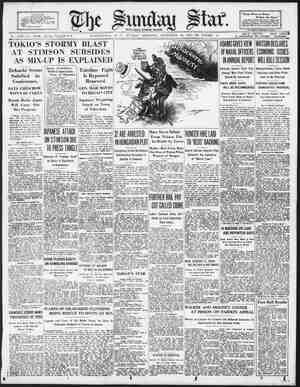Evening Star Newspaper, November 29, 1931, Page 83
You have reached the hourly page view limit. Unlock higher limit to our entire archive!
Subscribers enjoy higher page view limit, downloads, and exclusive features.
| Music Will F Che WASHINGTON, D.. C, NOVEMBER 29, 1931 iy Stad | Magasine Art Notes Features inland Kill Pr ohibition? That Country, Tewelve Years Ago, Under Nearly Ideal Conditions, Adopied a Dry Laz Similar to That of the United States—Today, Disillusioned by Corruption, a *“VV ickersham Comimission” Urges Repeal. « wu must finish your drinks ouickly,” the police warned. “It’s 1 o'clock, and the restaurant is supposed to be closed.” CE clinked softly in tall highball glasses throughout the sumptuously fitted restaurant. Now and then, punctuating the hum of quiet con- versation, there came the popping of a cork, as towel-wrapped wine bottles were removed from chill, sweating buck- ets of silver. The orchestra, which had been playing American jazz, launched abruptly upon a wild Apache selection, and, as the red silken shades of ‘table lamps and rose hangings beneath arches of ararabesque turned to purple in the pallid flood light that drenched the darkened cafe, two French dancers whirled through an ex- otic number. The dancers bowed, there was a last wail of the saxophone, and lights flashed on, and off, and on again. It was a signal that the time for closing had come. Waiters bent over tables of gayly gowned women and immaculate men to pour the farewell drinks. A famous Swedish actress, blond and jeweled, rose to leave, not unaware of the whispered comment that buzzed about her. In a gray and blue uniform, a general inter- rupted his conversation with a member of Parliament to signal for a waiter. At the table of an opera star, a novelist, a bank director and one of Finland’s great- est painters lifted their glasses to a final “Skol.” In half an hour all of the guests had departed, save for five or six parties oc- cupying tables in a small room off the main dining room. The manager moved from group to group. ~s<o~ By Ben _]ames “Tonig#t,” he said, “there is to be a police chrtk-up of the curfew law. Please take leav® as soon as possible.” BUT be’ore the manager had completed the rounds, the police had entered. There was no raucous speech by the leader from the center of the floor. In- stead, @, patrolman in long-belted coat of gray and round fur cap approached each party, saluted apologetically and warned; “You must finish your drinks quickly. It's 1 o’clock and the restaurant is suppssed to be closed.” Leisusely the remaining patrons drift- ed int the cloak room or made their way to. private dining rooms upstairs. The scene might have been in a famed restau’ant of Paris, Berlin or Copen- hagen,- where freedom gives charm to fine fcd, old wine and gayety. And the police; too, might have been well trained officer# doing their complete duty. But I hav:: reported what I saw cne evening last &nring in Finland’s capital during the tvelfth year of that nation’s life un- der a total prohibition law which makes illega! the manufacture, sale and trans- portztion of alcoholic beverages. Thy representative people of the nation were- ignoring the law, and the police were naively failing to enforce it—not in an obscure speakeasy, but in the Grand Restaurant Bors, Finland’s finest cafe, located in the new Chamber of Com- merce Building in Helsingfors. Shocking doubts bred by such reality are troubling the Finhs’ faith that age- old appetites can be abolished arbitrarily by writing chaste laws on statute books. And it is a long list of melancholy after- maths they see strung in the wake of a law launched with high hope under con- ditions logic would call ideal. Twelve years ago—virile, buqyant, de- termined—young Finland became an in- dependent nation. Willing to dare and sacrifice for the making of an ideal mod- ern state, she pioneered in social reforms. One of the first laws passed was a na- tional prohibition act. Every vision of the law’'s success was justifiable. Basic obstacles that stood in the way of en- forcement of an identical statute in the United States were lacking in Finland. The experiment was undertaken by a small, homogeneous group of 3,500,000 patriots, tested and proved in the phe- nomenal maintenance of their national- ism through four centuries of foreign oppression. None of the problems of a country made up of many unassimilated races was theirs. No corrupt political ma- chines were in existence. No vast tesri- tory with regional distinctions harassed them. They were relatively isolated from the influences of the continent, A single church held sway in the land. The people were law-abiding. Even through a century of bitter strug« gle for independence from Russia only legal channels had been used to gain their ends. BU'I‘ despite this glowing background that pointed to a complete success, today disillusioned, her dream of achiev- ing temperance through hasty scribbling of a parliamentary measure blasted, Fin- land seems about to repeal its prohibi- tory law. An unprejudiced committee of talented, public-spirited experts appoint- ed last Winter by the government— Finland’s Wickersham commission—has completed its investigations and declares prohibition in Finland has “fostered smuggling, bootlegging, political dishon- esty and social disorder.” These charges laid at the door of the prohibitory law grew out of the sccial re- action that seems inherent in that arbi- trary regulation. For in the placid .northland divorced from the United States by distance and vast differences in temperament, Finland found that the leap into compulsory. total abstinence called forth social perversions not unlike those observed in America. A people who should have become tem- perate upon the application of the law anomalously consumed more alcohol. Liquor, instead of vanishing from the
